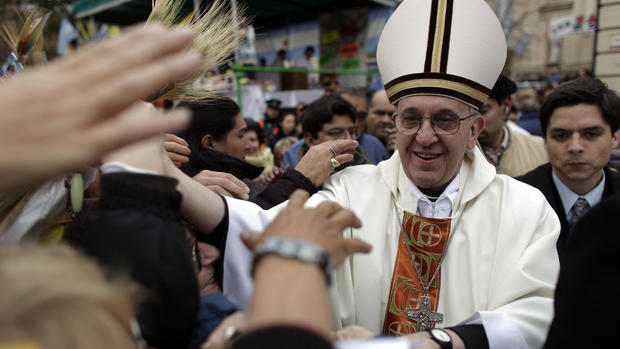Pope Francis gives conclave details in first audience with press
VATICAN CITY Pope Francis offered intimate insights Saturday into the moments after his papal election, telling an audience with the press that he was immediately inspired to take the name of St. Francis of Assisi because of his work for peace and the poor — and was embraced by another cardinal amid applause inside the conclave.
"Let me tell you a story," Francis said in a break from his prepared text during a special gathering for thousands of journalists, media workers and guests.
Francis then described how was comforted by his friend, Brazilian Cardinal Claudio Hummes, as it appeared the voting was going his way and it seemed "a bit dangerous" that he would reach the two-thirds necessary to be elected.
"He hugged me. He kissed me. He said don't forget about the poor," Francis recalled. "And that's how in my heart came the name Francis of Assisi," who devoted his life to the poor, missionary outreach and caring for God's creation.
He said some people have asked why he took the name since it also could suggest references to other figures including the co-founder of the pope's Jesuit order, Francis Xavier. But he said his intention came to his heart as an inspiration immediately after the election. St. Francis of Assisi, the pope said, was "the man of the poor. The man of peace. The man who loved and cared for creation — and in this moment we don't have such a great relationship with the creator. The man who gives us this spirit of peace, the poor man who wanted a poor church."
He then joked that some other cardinals suggested other names: Hadrian VI, after a great church reformer — a reference to the need for the pope to clean up the Vatican's messy bureaucracy. Someone else suggested Clement XV, to counter Clement XIV, who suppressed the Jesuit order.
In keeping with his reputation as a man of the people, Francis has been avoiding ostentatious events, CBS News correspondent Allen Pizzey reports from Vatican City.
When the huge papal apartments were opened for him, he remarked that there was "room enough for 300 people" and there was no need to redecorate.
A picture showed him trying to pay the bill at the hotel he stayed in before going into the conclave that elected him as pope.
The one issue the Vatican wants to go away is scrutiny of his record when he was head of the Jesuit order in Argentina during the so-called "dirty war" of the 1970s and early '80s, Pizzey reports.
There have been allegations that the then-Buenos Aires Archbishop Jorge Bergoglio didn't do enough to protect priests and others targeted by the military junta.
That may be why the rule for his first audience was "no questions," Pizzey reports. The order was a bit disconcerting, given that Saturday's meeting was with the 6,000 journalists accredited to cover the conclave.
The gathering in the Vatican begins a busy week for the pontiff that includes a planned March 23 visit with his predecessor at the papal retreat at Castel Gandolfo — a historic encounter that brings together the new pope and the first pope to resign in six centuries.
Among the talks, the Vatican said Saturday, will be a session with the president of Francis' homeland Argentina on Monday, the eve of his formal installation as pontiff. The pope has sharply criticized Christina Fernandez over her support for liberal measures such as gay marriage and free contraceptives.
But the most closely watched appointment will be Francis' journey next Saturday to the hills south of Rome for lunch with Benedict XVI, who set in motion the stunning papal transition with his decision become the first pope in 600 years to step down. The meeting will be private, but every comment and gesture on the sidelines will be scrutinized for hints of how the unprecedented relationship will take shape between the emeritus pontiff and his successor.
Benedict has been out of the public eye since officially leaving the papacy on Feb. 28 and the Vatican dismissed any suggestion that the former pope helped shaped the discussions inside the secret gathering of cardinals that selected Bergoglio on Wednesday as the first pontiff from Latin America. Vatican officials said there was no contact between the papal electors and Benedict before the conclave.
Benedict has promised to remain outside church affairs and dedicate himself to prayer and meditation. Pope Francis, however, has shown no reluctance to invoke Benedict's legacy and memory, in both an acknowledgment of the unusual dimensions of his papacy and also a message that he is comfortable with the situation and is now fully in charge.
World leaders and senior international envoys, including Vice President Joe Biden, are expected on Tuesday for the formal installation of Pope Francis. It offers the new pope his first opportunities to flex his diplomatic skills as head of Vatican city-state.
But the most potentially sensitive talks could come with Fernandez after years of open tensions over the then-archbishop's strong opposition to initiatives that led Argentina to become Latin American country to legalize gay marriage. He also opposed — but failed to stop — Fernandez from promoting free contraception and artificial insemination.
